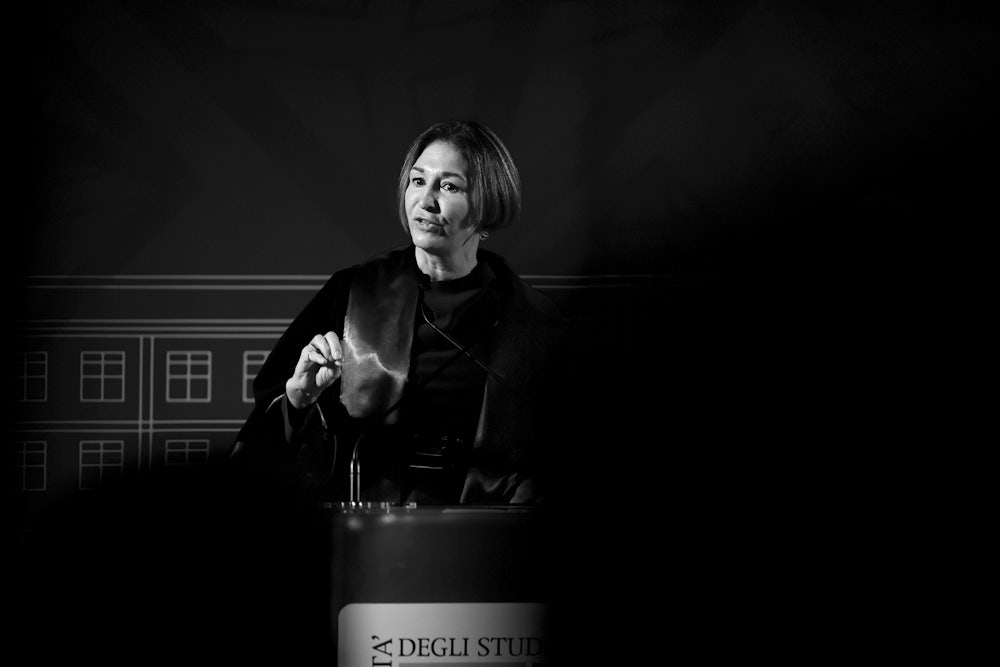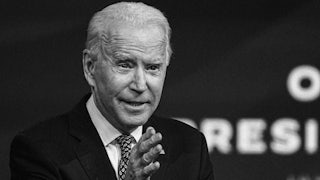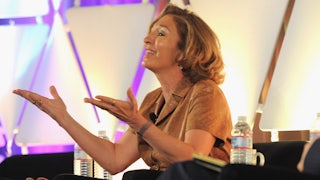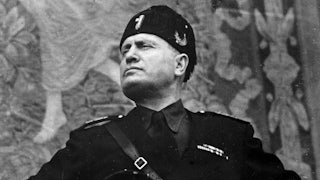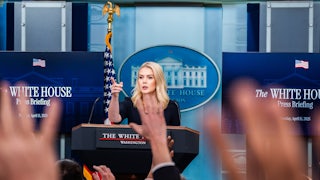Earlier this year, Anne-Marie Slaughter was invited by Democrats on the House Foreign Affairs Committee to testify on the future of American diplomacy. She was a natural choice for a witness. As a professor of politics and international affairs at Princeton University, and a former director of policy planning for the State Department under President Barack Obama, she had plenty of expertise on the hearing’s subject: “America Forward: Restoring Diplomacy and Development in a Fracturing World.”
“Genetic, linguistic, and cultural kinship is obviously not all it takes to create enduring bonds between nations,’’ Slaughter told the committee on February 24. “Political systems, geography, natural resources, and national values all play key roles. Moreover, even countries that appear very similar on the surface, such as the U.S. and Canada or Australia, still have plenty of cultural, ethical, and political differences. Still, if U.S. representatives abroad truly reflected the demography of the United States, we would have far greater cultural, linguistic, and historic channels of connection with the peoples of other nations.”
Slaughter also happens to be the CEO of New America, which describes itself as “a think and action tank dedicated to renewing the promise of America, bringing us closer to our nation’s highest ideals.” But Slaughter was not representing New America at the hearing—or so she stated in the disclosure form that all witnesses are required to complete before testifying in the House. She was merely representing herself, she claimed.
In doing so, though, she evaded disclosing a rather relevant detail: New America, according to its own website, reported receiving over $4 million in funding from the State Department and over $300,000 from Australia during the second quarter of 2021 (although the funding term with the Australian Department of Foreign Affairs and Trade reportedly began after the hearing was held). That fact, to some observers, might indicate a conflict of interest—or at least necessary context for her remarks. And yet neither Slaughter nor anyone on the committee noted as much.
Slaughter is hardly alone in this regard. Three other witnesses affiliated with New America also claimed to represent themselves, not the think tank, in testimony before House committees this year. The same is true for many of their peers at other think tanks who have testified in 2021. This despite the fact that House Democrats, to better identify potential conflicts of interest, in January strengthened the rules about what nongovernment witnesses must disclose prior to their testimony, now requiring that they divulge their ties with all relevant organizations, including any foreign or federal funding those organizations received that is related to the subject matter of the hearing.
I recently reached out to more than two dozen nongovernment witnesses who testified in the first eight months of 2021, contacted 14 House committee staffers, and analyzed all of the accessible witness disclosures online. I found that even the enhanced rules continue to have significant loopholes that undermine the push for greater transparency. It’s still all too common for think tank–affiliated witnesses to sidestep the enhanced disclosure rules by claiming they’re not representing their organizations but merely testifying on their own behalf, thereby bypassing the need to disclose any federal or foreign funding that might influence their testimony.
After I contacted New America for this story, the organization reached out to the Foreign Affairs Committee to update Slaughter’s disclosure form (though the committee has still not updated the disclosure on the Docs.House.Gov document repository). “While Dr. Slaughter was self-representing in her February 24 testimony, it was an oversight not to note New America’s past government funding pursuant to the January rule update,” the spokesperson said.
But other think tanks, like the Atlantic Council, are taking a more hard-line approach to the new rules.
The House first adopted the Truth in Testimony rule in 1997 as part of a conservative-led effort to identify witnesses dependent upon federal funding. Originally the rule only asked witnesses to disclose any relevant grants or contracts they had with the federal government, but it was amended in 2015 to require witnesses also to disclose any foreign funding that they or their organizations had received. The change was made after a 2014 New York Times investigation found that 64 foreign governments, entities, or officials contributed at least $92 million to 28 major U.S.-based think tanks over a four-year period. (The Senate, meanwhile, still does not have any rule requiring nongovernment witnesses to disclose potential conflicts of interest before they testify.)
Since think-tank staffers are often called upon to testify as experts in their fields, there were concerns that foreign funding could sway witnesses to testify in favor of the interests of other countries. But despite the 2015 rule changes, the issue didn’t go away. A January 2020 report by the Center for International Policy, or CIP—a nonprofit organization that has not received federal or foreign funding—found that the top 50 U.S. think tanks received at least $174 million in foreign funding from 2014 until 2018.
So in January, the House of Representatives further tightened the Truth in Testimony rule by requiring witnesses to disclose whether they are “the fiduciary of any organization or entity with an interest in the subject matter of the hearing.” Previously, witnesses only had to declare what organization(s) they were representing at the hearing; now, they’re effectively being asked to declare all of their relevant professional connections, even if they’re just, say, an adviser. The updates to the rule, first proposed by Democratic Representative Katie Porter of California, also require witnesses to disclose whether they or the entities they represent received grants from foreign sources, requiring witnesses to disclose any such funding received in the last 36 months, and requiring House committees to make the disclosures publicly available 24 hours before a hearing is held. “Hearings are opportunities to get answers for the American people—we need to know about foreign influence or any risk of self dealing with the witnesses called before Congress,” Porter said in a press release.
By strengthening the rule, the House hoped to highlight some of the special interests that could influence expert witnesses—many of whom are affiliated with leading think tanks that are driving critical conversations around U.S. policy. But even with the updated language, major loopholes remain: Witnesses are allowed to decide whether they’re representing themselves or an organization, and it’s also up to them to determine whether any funding their organization has received is related to the subject of the hearing.
Of the 70 witnesses who testified before the 20 standing House committees (excluding joint and special committees) through the August recess and were affiliated with one of the think tanks the CIP’s report identified as having received foreign funding, just 14 of them testified on behalf of their organizations (two of the relevant witness disclosures were not accessible online). And fewer than half of witnesses affiliated with one of these think tanks—29 in total—disclosed any relevant funding that their organizations had received on their disclosures, regardless of whether or not they testified on behalf of themselves.
Although witnesses must sign a “False Statements Certification” box at the bottom of their disclosures noting that it is a federal crime under 18 U.S.C. § 1001 to intentionally withhold any conflicts, the ambiguous language on the forms and self-reporting component make it difficult for witnesses to follow a streamlined process for disclosing relevant information. And while the House Rules Committee pushed the new disclosure rules for the current Congress, it is not responsible for overseeing enforcement of the requirements across all of the committees. “Individual committees are tasked with implementation,” said Jeff Gohringer, a spokesman for the Rules Committee.
This means that each House committee must independently verify the information disclosed on the forms and determine the nature of “fiduciary” and “related to the hearing’s subject matter.” According to the text of the House rules, positions considered to be a fiduciary include, but are not limited to, the “director, officer, advisor, or resident agent” of an entity. While a think tank–affiliated witness testifying on behalf of themselves would still, ostensibly, be considered a fiduciary of their organization, that is not always the case. Instead, many of the think tanks contacted for this piece consider their fellows not to be fiduciaries and thus not required to disclose any relevant foreign or federal funding the organizations might have received.
While a New America spokesperson says the organization reached out to the Foreign Affairs Committee to update Anne-Marie Slaughter’s disclosure, the committee has yet to upload an updated form to the document repository. The spokesperson also said that the three other witnesses who testified at House hearings besides Slaughter, including two senior fellows and a director, were not considered fiduciaries by the organization’s standards. And not one of the six witnesses from the Atlantic Council who testified before House committees through the end of August disclosed any of the foreign funding that the organization has received, despite half of them testifying before the Foreign Affairs and Homeland Security committees.
According to the Atlantic Council’s online “Honor Roll of Contributors,” the think tank has received, in part, over $1 million each from the Embassy of the United Arab Emirates and the British Foreign and Commonwealth Office, and between $100,000 and $249,999 from the Embassy of Bahrain.
As The American Prospect’s Jonathan Guyer reported, when Kirsten Fontenrose—the director of the Atlantic Council’s Scowcroft Middle East Security Initiative and a former director of Gulf affairs at the National Security Council during the Trump administration—testified at a March 18 House Foreign Affairs Committee hearing on “Assessing the Human Rights Situation in Saudi Arabia,” she did not disclose any of the funding from Bahrain or the UAE. Alex Kisling, a spokesman for the Atlantic Council, said that since the think tank has not received funding from Saudi Arabia, it did not have to disclose funding from the UAE or Bahrain, because they were not the direct subject of the hearing. Both countries are known for being close allies of Saudi Arabia. Fontenrose did not respond to a request for comment.
I asked Kisling why all of the Atlantic Council’s witnesses testify on behalf of themselves instead of the organization. “The Atlantic Council does not take an institutional stand on individual policy issues, and our staff therefore do not represent the view of the organization when they testify before Congress,” he said, adding that “it is standard practice for our experts to note their Atlantic Council affiliation in written and oral testimony to inform the committee about their current professional role and credentials; they commonly note their past affiliations in their testimony for the same purpose.”
Witnesses who are affiliated with think tanks, or even in leadership roles within the organizations, are often invited to testify at hearings as a result of their prior roles within the federal government. This creates additional questions about what should and should not be disclosed, since these witnesses are often still fiduciaries of their think tanks but have been invited to testify because of their past government experience.
Ivo Daalder, who has served as president of the Chicago Council on Global Affairs since 2013, was invited to testify at a June 24 House Foreign Affairs Committee hearing on “NATO 2030: A Celebration of Origins and an Eye Toward the Future.” According to the CIP report, the Chicago Council has previously received funding from the governments of Japan, Norway, South Korea, and others. On his disclosure, Daalder said he was testifying on behalf of himself.
When contacted, Daalder said he was invited to the hearing because he served as the U.S. ambassador to NATO during the Obama administration and not because of his leadership of the Chicago Council. The committee’s hearing notice lists him as the president of the Chicago Council, with his status as “Former U.S. Ambassador to NATO” underneath in italics. “Had I not served in that capacity, I would not have been asked to testify,” Daalder said. “That is why I said I was testifying on behalf of myself.”
Some think tank–affiliated witnesses still make a point of disclosing any relevant conflicts that they might personally have. Dr. Michael Boskin—an economics professor at Stanford University and a senior fellow with the Hoover Institution—testified before the Transportation Subcommittee on Transportation and Infrastructure on July 29 in a hearing called “Assessing the Federal Government’s Covid-19 Relief and Response Efforts and Its Impact.” Although he testified in his own personal capacity, Boskin nonetheless disclosed that he serves on the board of directors for Oracle and Bloom Energy, despite also noting their “minor, indirect interests” to the topic of pandemic relief efforts.
When asked why he chose to disclose these connections, Boskin—who served as chairman of the President’s Council of Economic Advisers from 1989 to 1993—said, “I always err on the side of caution” when disclosing anything that could be interpreted as a conflict. While the focus of the committee’s hearing made any disclosure of foreign funding the Hoover Institution might have received a moot point, Boskin said it’s largely routine for think-tank fellows to separate themselves from their organizations when testifying before Congress. “I think that’s pretty common in the academic and think-tank world, that people do not purport to speak for their organizations, since that’s kind of derivative from academic freedom principles,” he said. “If any of those institutions wants to take a stand on a particular issue, then they have spokespeople to do that.”
Tim Stretton, the director of the Congressional Oversight Initiative at the Project for Government Oversight, or POGO, said part of the overall problem is that giving witnesses the opportunity to self-select whether they are testifying on behalf of themselves or their organizations on the disclosures makes adhering to the rule’s requirements more difficult. “Since it’s all self-reporting, it’s up to Congress to determine how to enforce this rule,” he said. “These issues have been raised before, but it seems like some of the changes in practice haven’t been made. And you’re not going to see individuals or organizations doing a better job of disclosing more information if they don’t think it’s going to cost them.”
The updates to the Truth in Testimony rule earlier this year do promote greater insights into the potential conflicts of nongovernment witnesses appearing before House committees—when appropriately enforced. But fully enforcing the rule depends on House committees uniformly imposing the same oversight standards as one another. And the new requirement for committees to make witness disclosures “publicly accessible” 24 hours before a hearing is often flouted.
Over the first eight months of 2021, the Financial Services Committee failed to upload the disclosures of 65 nongovernment witnesses to the House’s document repository out of the 44 committee and subcommittee hearings that were held. When contacted about the missing forms, a committee staffer said a “technical glitch” resulted in the disclosures not being properly uploaded and that they were working to upload all the missing forms. “The website is kind of wonky, and it’s not only an issue for us that we had missing links,” the staffer said, referring to the House’s online document repository. “We reached out to other committees as well and found out that it’s also a common issue for them.”
The staffer also added that, while the Democratic majority on the committee has a vetting process for the disclosure forms and testifying witnesses, the Republican minority is largely responsible for vetting its invited witnesses. Despite that, it’s the Democratic committee staffers’ job to collect and upload the Republican witness forms—including their disclosures and written testimonies—to the document repository.
The House Homeland Security Committee was also missing disclosures from 13 of the 52 nongovernment witnesses who testified before the committee through the end of August. After being contacted about the absent forms, the committee retroactively backfilled some of the missing disclosures without offering an explanation as to why they were not already online, but it still did not add five of the previously unavailable disclosures to the document repository.
Not all House committees are negligent in following the new rules. The House Armed Services Committee, for example, takes the extra step of requiring nongovernment witnesses to disclose payments and grants “originating with any organization or entity, whether public or private, that has a material interest in the subject matter of the hearing.” The committee has included the additional language on its disclosure forms since 2018. Committee staffers wouldn’t tell me why the additional requirement was added.
Stretton said that the Armed Services Committee’s enhanced disclosure requirements could serve as a model for strengthening the Truth in Testimony rule by adding a much-needed additional level of transparency to witness testimonies. “A lot of times these organizations have more private funding than public, so it’s equally, if not more, important to know who these relevant private funders are,” Stretton said.
